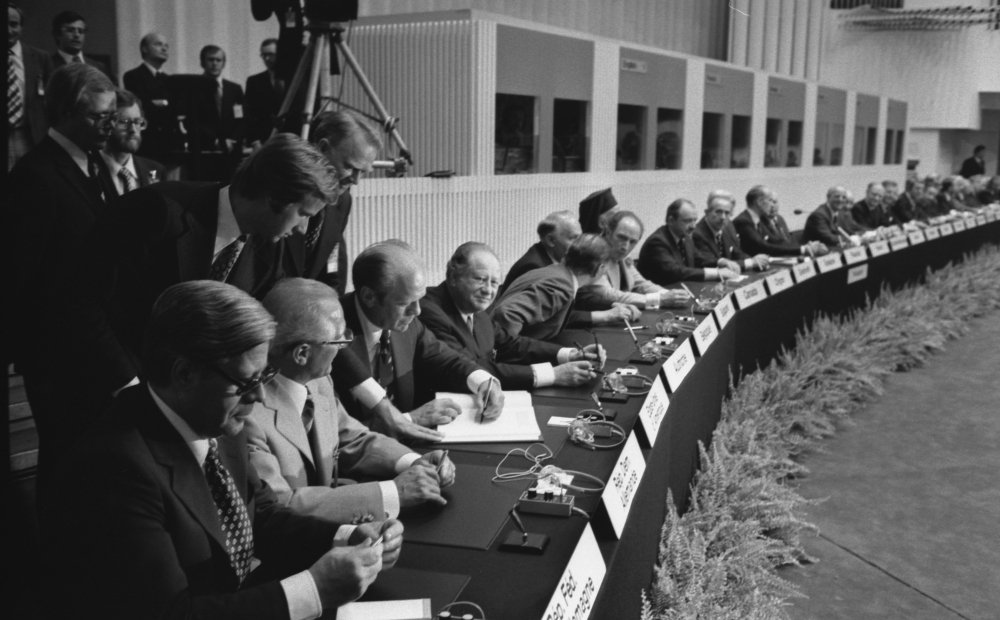Dynamic Détente: The United States and Europe, 1964‐1975

Dynamic Détente: The United States and Europe, 1964‐1975
Stephan Kieninger argues in Dynamic Détente: The United States and Europe, 1964-1975 that the power of dynamic détente policies transformed Europe in the shadow of the military status quo. He challenges the traditional Cold War narrative that détente prolonged the division of Europe and precipitated America’s decline in the aftermath of the Vietnam War. His book investigates the origins and the implementation of American policies to overcome Europe’s division peacefully through the kind of dynamic détente that was codified in the Helsinki Final Act of 1975. Kieninger argues that policymakers in the U.S. Department of State and in Western Europe envisaged the stability enabled by détente as a precondition for change, as Communist regimes saw a sense of security as a prerequisite for opening up their societies to Western influence over time. Kieninger identifies the Helsinki Accords, Lyndon Johnson’s bridge building, and Willy Brandt’s Ostpolitik as efforts aimed at constructive changes in Eastern Europe through a multiplication of contacts, communication, and cooperation on all societal levels.
Join us on November 29 for a special discussion of Dynamic Détente: The United States and Europe, 1964-1975 with author Stephan Kieninger and commentator Ambassador James E. Goodby.
Dr. Stephan Kieninger is a fellow at the Berlin Center for Cold War Studies. Previously, he was a research associate at the Office of the Historian at the Federal German Archives. He gained his PhD in Modern History at Mannheim University, Germany. His research focuses on U.S. diplomatic history and Europe’s international history. Currently, he is writing a book on natural gas trade with the Soviet Union and the transformation of Europe’s security system.
James E. Goodby achieved the rank of Career Minister in the Senior Foreign Service, was appointed Ambassador to Finland, and held three other Ambassadorial-level assignments. He has taught at Georgetown, Syracuse, and Carnegie Mellon Universities. Ambassador Goodby is a research fellow at the Hoover Institution. During his Foreign Service career, he was involved as a negotiator or as a policy adviser in the creation of the International Atomic Energy Agency, the negotiation of the limited nuclear test ban treaty, NATO’s preparations for the Conference on Security and Cooperation in Europe, START, the Conference on Disarmament in Europe, and cooperative threat reduction (the Nunn-Lugar program). Goodby is the author and editor of several books. His most recent publication is The War That Must Never Be Fought: Dilemmas of Nuclear Deterrence (Hoover Institution Press, 2015) edited with George P. Shultz. Among else, he wrote At the Borderline of Armageddon: How American Presidents Managed the Atom Bomb (Rowman & Littlefield, 2006), and Europe Undivided: The New Logic of Peace in U.S.-Russian Relations (United States Institute of Peace Press, 1998).
Speakers

Hosted By

Cold War International History Project
The Cold War International History Project supports the full and prompt release of historical materials by governments on all sides of the Cold War. Read more


History and Public Policy Program
A leader in making key foreign policy records accessible and fostering informed scholarship, analysis, and discussion on international affairs, past and present. Read more


Nuclear Proliferation International History Project
The Nuclear Proliferation International History Project is a global network of individuals and institutions engaged in the study of international nuclear history through archival documents, oral history interviews, and other empirical sources. Read more
